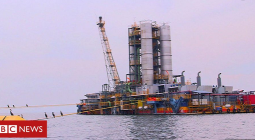Europe quietly bids adieu to climate-wrecking F-gases
Fluorinated gases will be phased down to near zero by 2030, according to a new regulation agreed on Tuesday (16 January) in the European Parliament that will officially become law later this year.
F-gases are a family of refrigerants that were introduced in the 1990s to replace the ozone-depleting CFCs and HCFCs but which are 140 to 23,500 times more harmful than CO2 for the climate.
Today, the sector is responsible for 2.5% of the EU’s greenhouse gas emissions, and the European Commission proposed to phase them down in a proposal tabled in 2021.
The European Parliament concluded the legislative process on Tuesday (16 January), with a text that was accepted with 457 votes in favour and 92 against.
The last step in the procedure will be formal approval by EU countries, which is expected to be only a formality after a polticial deal was struck with Parliament in October.
“Putting an end to F-gases is crucial, not only because these gases are extremely harmful for the climate, but we are also providing clarity and investment certainty for industry,” said the Greens’ Bas Eickhout, who led the negotiations on behalf of Parliament.
Eickhout is a true veteran of the law – this is his second time on the gig after the last reform in the early 2010s.
In concrete terms, the law will quickly phase down the use of F-gases in Europe to near zero by 2030.
Industry use
F-gases are currently essential in operating electrical equipment, known as switchgear, used as coolants in heat pumps and have several medical applications.
Ultimately, all sectors will have to switch to natural coolants with a lower climate impact by 2050.
In other provisions, the repair of equipment running on F-gases will be regulated more strictly to prevent the climate-wrecking gas from escaping. This will include a mandate to reuse F-gas.
The repair industry remains sceptical. “The supply of refrigerants for the maintenance and repair of existing systems will become scarcer as a result of the regulation,” said the German trades association ZDH. They lauded the European Commission for creating a backup clause in case of shortages, one of many backdoors introduced into the law.
A surge in political interest for heat pumps ended up torpedoing talks to conclude the law, delaying negotiations by several months.
EPEE, an industry association representing manufacturers of air conditioners and heat pumps who will be affected by the ban, said the “thoughtless” move would “only serve to prolong our reliance on fossil fuels” by limiting the “production, sale and installation” of their products.
The law, as agreed, will be a boon to European industry, say the lawmakers involved. Eickhout says having a clear target is “good for European industry, which will remain at the forefront of innovation and cleaner products”.
German praise
Particularly, the companies located in the bloc’s biggest country stand to benefit.
“German companies are leading the way in providing alternative modern technologies for climate protection,” said Peter Liese, a centre-right German lawmaker from the European People’s Party (EPP) who wasn’t directly involved in the negotiations.
“Two years ago, companies approached me and asked me to completely ban the insulating gas SF6 in switchgear because there were already alternatives,” he added.
F-gas-free switchgear – essential to modern electrical grids – is one of the products offered by Siemens Energy, a German company. Other companies, primarily Asian ones, sought to introduce exemptions during the negotiations, with some success. Switchgear without F-gas will only be mandatory from 2032 should supplies be sufficient.
“The result of the F-Gas Regulation on the reduction of F-gases in grid technology is a twofold win,” said Siemens Energy’s chief EU lobbyist, Benedikt Herges, who lauded the positive impacts on the climate and industry who can start planning.
Cover photo: Dutchman Bas Eickhout has largely soundlessly wrestled a law that will see Brussels ban 2.5% of the bloc's greenhouse gases. [EP/Philippe STIRNWEISS]





